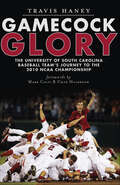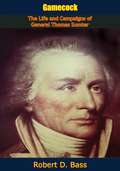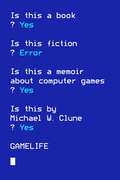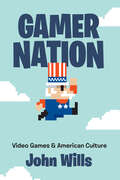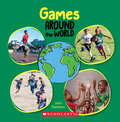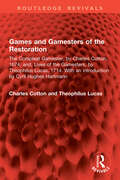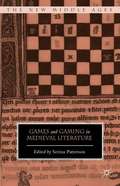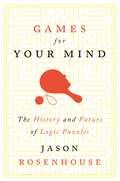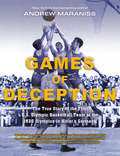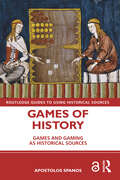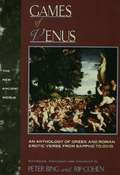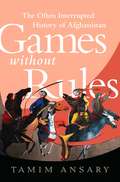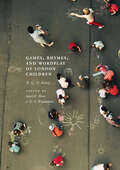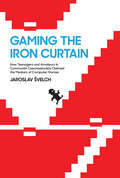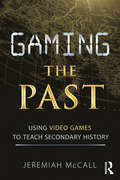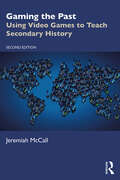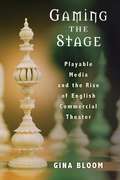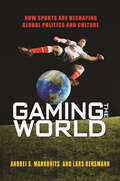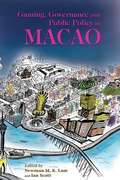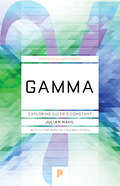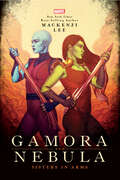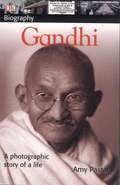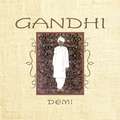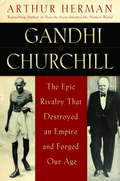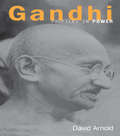- Table View
- List View
Gamecock Glory: The University of South Carolina Baseball Team's Journey to the 2010 NCAA Championship (Sports)
by Travis HaneyAfter more than one hundred years of craving a champion, the University of South Carolina finally has one. The 2010 Gamecock baseball team won six consecutive games over eight summer nights to take the College World Series and lay claim to the school's first major national championship. From dancing around in a dark locker room to singing "Silent Night"? on the team bus after every victory in Omaha, these Gamecocks were as fun-loving as they were talented. And they did it all in the name of one special boy, seven-year-old Bayler Teal. Bayler passed away before he could see his beloved Gamecocks triumph, but the team's victory is a tribute to their number one fan. Join the Post and Courier's Travis Haney as he recounts this incredible team's historic season.
Gamecock: The Life and Campaigns of General Thomas Sumter
by Robert D. BassThis is a 1961 biography by distinguished historian and author, Dr. Robert D. Bass, of the elusive American general Thomas Sumter—nicknamed the “Carolina Gamecock,” for his fierce fighting style—and his campaigns against the British Army in the South during the American Revolution.Thomas Sumter (August 14, 1734 - June 1, 1832) was a soldier in the Colony of Virginia militia, a brigadier general in the South Carolina militia during the American War of Independence, a planter, and a politician. After the United States gained independence, he was elected to the United States House of Representatives and to the United States Senate, where he served from 1801-1810, when he retired.
Gamelife: A Memoir
by Michael W. Clune<p>You have been awakened. <p>Floppy disk inserted, computer turned on, a whirring, and then this sentence, followed by a blinking cursor. So begins Suspended, the first computer game to obsess seven-year-old Michael, to worm into his head and change his sense of reality. Thirty years later he will write: "Computer games have taught me the things you can't learn from people." <p>Gamelife is the memoir of a childhood transformed by technology. Afternoons spent gazing at pixelated maps and mazes train Michael's eyes for the uncanny side of 1980s suburban Illinois. A game about pirates yields clues to the drama of cafeteria politics and locker-room hazing. And in the year of his parents' divorce, a spaceflight simulator opens a hole in reality. <p>In telling the story of his youth through seven computer games, Michael W. Clune captures the part of childhood we live alone.</p>
Gamer Nation: Video Games and American Culture
by John WillsExplores how games actively influence the ways people interpret and relate to American life.In 1975, design engineer Dave Nutting completed work on a new arcade machine. A version of Taito's Western Gun, a recent Japanese arcade machine, Nutting's Gun Fight depicted a classic showdown between gunfighters. Rich in Western folklore, the game seemed perfect for the American market; players easily adapted to the new technology, becoming pistol-wielding pixel cowboys. One of the first successful early arcade titles, Gun Fight helped introduce an entire nation to video-gaming and sold more than 8,000 units.In Gamer Nation, John Wills examines how video games co-opt national landscapes, livelihoods, and legends. Arguing that video games toy with Americans' mass cultural and historical understanding, Wills show how games reprogram the American experience as a simulated reality. Blockbuster games such as Civilization, Call of Duty, and Red Dead Redemption repackage the past, refashioning history into novel and immersive digital states of America. Controversial titles such as Custer's Revenge and 08.46 recode past tragedies. Meanwhile, online worlds such as Second Life cater to a desire to inhabit alternate versions of America, while Paperboy and The Sims transform the mundane tasks of everyday suburbia into fun and addictive challenges.Working with a range of popular and influential games, from Pong, Civilization, and The Oregon Trail to Grand Theft Auto, Silent Hill, and Fortnite, Wills critically explores these gamic depictions of America. Touching on organized crime, nuclear fallout, environmental degradation, and the War on Terror, Wills uncovers a world where players casually massacre Native Americans and Cold War soldiers alike, a world where neo-colonialism, naive patriotism, disassociated violence, and racial conflict abound, and a world where the boundaries of fantasy and reality are increasingly blurred. Ultimately, Gamer Nation reveals not only how video games are a key aspect of contemporary American culture, but also how games affect how people relate to America itself.
Games Around the World (Around the World)
by John PerritanoDiscover countries, cultures, and traditions in this new series!Every day, all around the world, kids go to school, eat lunch and play games... And yet, these universal experiences, can look very different between different countries. These books will take our readers on a trip around the globe to celebrate diverse cultures and traditions, and will show us how different (and how similar) we all are!
Games and Gamesters of the Restoration: The Compleat Gamester, by Charles Cotton, 1674; and, Lives of the Gamesters, by Theophilus Lucas, 1714. With an introduction by Cyril Hughes Hartmann (Routledge Revivals)
by Charles Cotton Theophilus LucasGames and Gamesters of the Restoration (1930) reprints two vastly different books The Compleat Gamester (1674) and Lives of the Gamesters (1714) that together give a comprehensive and representative view of gamesters and gambling in the latter half of the seventeenth century – a time that saw an explosion in such pursuits following the end of Cromwell’s rule.
Games and Gaming in Medieval Literature
by Serina PattersonGames and Gaming in Medieval Literature constitutes the first collection that explores the depth and breadth of games in medieval literature and culture. With geographical and methodological diversity of interdisciplinary scholarship, this volume presents fresh critical discussions of medieval games as vehicles for cultural signification, and challenges scholars to reconsider how games were understood by medieval writers, compilers, scribes, players, audiences, and communities. Chapters span from the twelfth to the sixteenth centuries, and cover Europe from England, France, Denmark, Poland, and Spain. This volume not only brings to the forefront a re-examination of medieval games in diverse social settings - the Church, the court, the school, and the gentry household - but also their multifaceted relation to literary discourses as systems of meaning, interactive experiences, and modes of representation.
Games for Your Mind: The History and Future of Logic Puzzles
by Jason RosenhouseA lively and engaging look at logic puzzles and their role in recreation, mathematics, and philosophyLogic puzzles were first introduced to the public by Lewis Carroll in the late nineteenth century and have been popular ever since. Games like Sudoku and Mastermind are fun and engrossing recreational activities, but they also share deep foundations in mathematical logic and are worthy of serious intellectual inquiry. Games for Your Mind explores the history and future of logic puzzles while enabling you to test your skill against a variety of puzzles yourself.In this informative and entertaining book, Jason Rosenhouse begins by introducing readers to logic and logic puzzles and goes on to reveal the rich history of these puzzles. He shows how Carroll's puzzles presented Aristotelian logic as a game for children, yet also informed his scholarly work on logic. He reveals how another pioneer of logic puzzles, Raymond Smullyan, drew on classic puzzles about liars and truthtellers to illustrate Kurt Gödel's theorems and illuminate profound questions in mathematical logic. Rosenhouse then presents a new vision for the future of logic puzzles based on nonclassical logic, which is used today in computer science and automated reasoning to manipulate large and sometimes contradictory sets of data.Featuring a wealth of sample puzzles ranging from simple to extremely challenging, this lively and engaging book brings together many of the most ingenious puzzles ever devised, including the "Hardest Logic Puzzle Ever," metapuzzles, paradoxes, and the logic puzzles in detective stories.
Games of Deception: The True Story of the First U.S. Olympic Basketball Team at the 1936 Olympics in Hitler's Germany
by Andrew Maraniss*"Rivaling the nonfiction works of Steve Sheinkin and Daniel James Brown's The Boys in the Boat....Even readers who don't appreciate sports will find this story a page-turner." --School Library Connection (starred review)"An insightful, gripping account of basketball and bias." --Kirkus ReviewsFrom the New York Times bestselling author of Strong Inside comes the remarkable true story of the birth of Olympic basketball at the 1936 Summer Games in Hitler's Germany. Perfect for fans of The Boys in the Boat and Unbroken.On a scorching hot day in July 1936, thousands of people cheered as the U.S. Olympic teams boarded the S.S. Manhattan, bound for Berlin. Among the athletes were the 14 players representing the first-ever U.S. Olympic basketball team. As thousands of supporters waved American flags on the docks, it was easy to miss the one courageous man holding a BOYCOTT NAZI GERMANY sign. But it was too late for a boycott now; the ship had already left the harbor. 1936 was a turbulent time in world history. Adolf Hitler had gained power in Germany three years earlier. Jewish people and political opponents of the Nazis were the targets of vicious mistreatment, yet were unaware of the horrors that awaited them in the coming years. But the Olympians on board the S.S. Manhattan and other international visitors wouldn't see any signs of trouble in Berlin. Streets were swept, storefronts were painted, and every German citizen greeted them with a smile. Like a movie set, it was all just a facade, meant to distract from the terrible things happening behind the scenes. This is the incredible true story of basketball, from its invention by James Naismith in Springfield, Massachusetts, in 1891, to the sport's Olympic debut in Berlin and the eclectic mix of people, events and propaganda on both sides of the Atlantic that made it all possible. Includes photos throughout, a Who's-Who of the 1936 Olympics, bibliography, and index.Praise for Games of Deception:"Maraniss does a great job of blending basketball action with the horror of Hitler's Berlin to bring this fascinating, frightening, you-can't-make-this-stuff-up moment in history to life." -Steve Sheinkin, New York Times bestselling author of Bomb and Undefeated"I was blown away by Games of Deception....It's a fascinating, fast-paced, well-reasoned, and well-written account of the hidden-in-plain-sight horrors and atrocities that underpinned sports, politics, and propaganda in the United States and Germany. This is an important read." -Susan Campbell Bartoletti, Newbery Honor winning author of Hitler Youth"A richly reported and stylishly told reminder how, when you scratch at a sports story, the real world often lurks just beneath." --Alexander Wolff, New York Times bestselling author of The Audacity of Hoop: Basketball and the Age of Obama
Games of History: Games and Gaming as Historical Sources (Routledge Guides to Using Historical Sources)
by Apostolos SpanosGames of History provides an understanding of how games as artefacts, textual and visual sources on games and gaming as a pastime or a “serious” activity can be used as sources for the study of history. From the vast world of games, the book’s focus is on board and card games, with reference to physical games, sports and digital games as well. Considering culture, society, politics and metaphysics, the author uses examples from various places around the world and from ancient times to the present to demonstrate how games and gaming can offer the historian an alternative, often very valuable and sometimes unique path to the past. The book offers a thorough discussion of conceptual and material approaches to games as sources, while also providing the reader with a theoretical starting point for further study within specific thematic chapters. The book concludes with three case studies of different types of games and how they can be considered as historical sources: the gladiatorial games, chess and the digital game Civilization. Offering an alternative approach to the study of history through its focus on games and gaming as historical sources, this is the ideal volume for students considering different types of sources and how they can be used for historical study, as well as students who study games as primary or secondary sources in their history projects.
Games of Venus: An Anthology of Greek and Roman Erotic Verse from Sappho to Ovid
by Peter Bing Rip CohenRecent attacks on contemporary art have portrayed the erotic content of works by Robert Mapplethorpe and others as if it were a deviation from the Western artistic tradition. On the contrary, there is a rich tradition of eroticism in the arts beginning with the erotic verse of ancient Greek and Roman poets. Games of Venus, the first comprehensive anthology in English of ancient Greek and Roman erotic verse, revives this tradition for the modern reader. Games of Venus presents the whole spectrum of erotic poetry from Sappho to Ovid in translations which evoke the full range of styles and tones present in the original Greek and Latin. Brief biographical sketches accompany the work of each poet as do notes referring to the myths, geography, historical events, personages, and sexual and social customs mentioned in the verse.
Games without Rules: The Often-Interrupted History of Afghanistan
by Tamim AnsaryToday, most Westerners still see the war in Afghanistan as a contest between democracy and Islamist fanaticism. That war is real; but it sits atop an older struggle, between Kabul and the countryside, between order and chaos, between a modernist impulse to join the world and the pull of an older Afghanistan: a tribal universe of village republics permeated by Islam.<P><P> Now, Tamim Ansary draws on his Afghan background, Muslim roots, and Western and Afghan sources to explain history from the inside out, and to illuminate the long, internal struggle that the outside world has never fully understood. It is the story of a nation struggling to take form, a nation undermined by its own demons while, every 40 to 60 years, a great power crashes in and disrupts whatever progress has been made. Told in conversational, storytelling style, and focusing on key events and personalities, Games without Rules provides revelatory insight into a country at the center of political debate.
Games, Rhymes, and Wordplay of London Children
by N. G. KelseyThis book presents a unique annotated collection of some 2000 playground games, rhymes, and wordplay of London children. It charts continuity and development in childlore at a time of major social and cultural change and offers a detailed snapshot of changes in the traditions and language of young people. Topics include: starting a game; counting-out rhymes; games (without songs); singing and chanting games; clapping, skipping, and ball bouncing games; school rhymes and parodies; teasing and taunting; traditional belief and practice; traditional wordplay; and a concluding miscellany. Recorded mainly in the 1980s by primary schoolteacher Nigel Kelsey, transcribed verbatim from the children’s own words, and accompanied by extensive commentaries and annotation, the book sets a wealth of new information in the wider historical and contemporary context of existing studies in Britain, Ireland, and other parts of the English-speaking world. This valuable new resource will open new avenues for research and be of particular interest to folklorists and linguists, as well as to those working across the full spectrum of social, cultural, and educational studies.
Gaming the Iron Curtain: How Teenagers and Amateurs in Communist Czechoslovakia Claimed the Medium of Computer Games (Game Histories)
by Jaroslav SvelchHow amateur programmers in 1980s Czechoslovakia discovered games as a medium, using them not only for entertainment but also as a means of self-expression.Aside from the exceptional history of Tetris, very little is known about gaming culture behind the Iron Curtain. But despite the scarcity of home computers and the absence of hardware and software markets, Czechoslovakia hosted a remarkably active DIY microcomputer scene in the 1980s, producing more than two hundred games that were by turns creative, inventive, and politically subversive. In Gaming the Iron Curtain, Jaroslav Švelch offers the first social history of gaming and game design in 1980s Czechoslovakia, and the first book-length treatment of computer gaming in any country of the Soviet bloc. Švelch describes how amateur programmers in 1980s Czechoslovakia discovered games as a medium, using them not only for entertainment but also as a means of self-expression. Sheltered in state-supported computer clubs, local programmers fashioned games into a medium of expression that, unlike television or the press, was neither regulated nor censored. In the final years of Communist rule, Czechoslovak programmers were among the first in the world to make activist games about current political events, anticipating trends observed decades later in independent or experimental titles. Drawing from extensive interviews as well as political, economic, and social history, Gaming the Iron Curtain tells a compelling tale of gaming the system, introducing us to individuals who used their ingenuity to be active, be creative, and be heard.
Gaming the Past: Using Video Games to Teach Secondary History
by Jeremiah McCallDespite the growing number of books designed to radically reconsider the educational value of video games as powerful learning tools, there are very few practical guidelines conveniently available for prospective history and social studies teachers who actually want to use these teaching and learning tools in their classes. As the games and learning field continues to grow in importance, Gaming the Past provides social studies teachers and teacher educators help in implementing this unique and engaging new pedagogy. This book focuses on specific examples to help social studies educators effectively use computer simulation games to teach critical thinking and historical analysis. Chapters cover the core parts of conceiving, planning, designing, and implementing simulation based lessons. Additional topics covered include: Talking to colleagues, administrators, parents, and students about the theoretical and practical educational value of using historical simulation games. Selecting simulation games that are aligned to curricular goals Determining hardware and software requirements, purchasing software, and preparing a learning environment incorporating simulations Planning lessons and implementing instructional strategies Identifying and avoiding common pitfalls Developing activities and assessments for use with simulation games that facilitate the interpretation and creation of established and new media Also included are sample unit and lesson plans and worksheets as well as suggestions for further reading. The book ends with brief profiles of the majority of historical simulation games currently available from commercial vendors and freely on the Internet.
Gaming the Past: Using Video Games to Teach Secondary History
by Jeremiah McCallGaming the Past is a complete handbook to help pre-service teachers, current teachers, and teacher educators use historical video games in their classes to develop critical thinking skills. It focuses on practical information and specific examples for integrating critical thinking activities and assessments using video games into classes. Chapters cover the core parts of planning, designing, and implementing lessons and units based on historical video games. Topics include: Talking to administrators, parents, and students about the educational value of teaching with historical video games. Selecting games that are aligned to curricular goals by considering the genres of historical games. Planning and implementing game-based history lessons ranging from whole class exercises, to individual gameplay, to analysis in groups. Employing instructional strategies to help students learn to play and engage in higher level analysis Identifying and avoiding common pitfalls when incorporating games into the history class. Developing activities and assessments that facilitate interpreting and creating established and new media. Gaming the Past also includes sample unit and lesson plans, worksheets and assessment questions, and a list of historical games currently available, both commercial and freely available Internet games.
Gaming the Stage: Playable Media and the Rise of English Commercial Theater (Theater: Theory/Text/Performance)
by Gina BloomRich connections between gaming and theater stretch back to the 16th and 17th centuries, when England's first commercial theaters appeared right next door to gaming houses and blood-sport arenas. In the first book-length exploration of gaming in the early modern period, Gina Bloom shows that theaters succeeded in London's new entertainment marketplace largely because watching a play and playing a game were similar experiences. Audiences did not just see a play; they were encouraged to play the play, and knowledge of gaming helped them become better theatergoers. Examining dramas written for these theaters alongside evidence of analog games popular then and today, Bloom argues for games as theatrical media and theater as an interactive gaming technology. Gaming the Stage also introduces a new archive for game studies: scenes of onstage gaming, which appear at climactic moments in dramatic literature. Bloom reveals plays to be systems of information for theater spectators: games of withholding, divulging, speculating, and wagering on knowledge. Her book breaks new ground through examinations of plays such as The Tempest, Arden of Faversham, A Woman Killed with Kindness, and A Game at Chess; the histories of familiar games such as cards, backgammon, and chess; less familiar ones, like Game of the Goose; and even a mixed-reality theater videogame.
Gaming the World: How Sports Are Reshaping Global Politics and Culture
by Andrei S. Markovits Lars RensmannThe globalizing influence of professional sportsProfessional sports today have truly become a global force, a common language that anyone, regardless of their nationality, can understand. Yet sports also remain distinctly local, with regional teams and the fiercely loyal local fans that follow them. This book examines the twenty-first-century phenomenon of global sports, in which professional teams and their players have become agents of globalization while at the same time fostering deep-seated and antagonistic local allegiances and spawning new forms of cultural conflict and prejudice.Andrei Markovits and Lars Rensmann take readers into the exciting global sports scene, showing how soccer, football, baseball, basketball, and hockey have given rise to a collective identity among millions of predominantly male fans in the United States, Europe, and around the rest of the world. They trace how these global—and globalizing—sports emerged from local pastimes in America, Britain, and Canada over the course of the twentieth century, and how regionalism continues to exert its divisive influence in new and potentially explosive ways. Markovits and Rensmann explore the complex interplay between the global and the local in sports today, demonstrating how sports have opened new avenues for dialogue and shared interest internationally even as they reinforce old antagonisms and create new ones.Gaming the World reveals the pervasive influence of sports on our daily lives, making all of us citizens of an increasingly cosmopolitan world while affirming our local, regional, and national identities.
Gaming, Governance and Public Policy in Macao
by Newman M.K. LamThe small city of Macao--formerly a Portuguese colony, now a Special Administrative Region of China--liberalised its gaming industry in 2002. Since then a score of new casinos have been built and millions of gamblers have flooded in from mainland China. Per capita income has more than doubled in five years and the gaming operators have outstripped their Las Vegas counterparts in revenue and profits. But rapid economic growth has also brought social and political problems. In this structured survey of modern Macao, 15 experts examine the effects of massive foreign investment, the problems of governance, and increasing public policy challenges in a time of rapid change and potential social instability. Newman M. K. Lamis professor of public administration at the University of Macau. Ian Scottis emeritus professor and fellow of the Asia Research Centre at Murdoch University and adjunct professor of public and social administration at the City University of Hong Kong.
Gamma: Exploring Euler's Constant (Princeton Science Library #53)
by Julian HavilAmong the many constants that appear in mathematics, π, e, and i are the most familiar. Following closely behind is y, or gamma, a constant that arises in many mathematical areas yet maintains a profound sense of mystery. In a tantalizing blend of history and mathematics, Julian Havil takes the reader on a journey through logarithms and the harmonic series, the two defining elements of gamma, toward the first account of gamma's place in mathematics. Introduced by the Swiss mathematician Leonhard Euler (1707-1783), who figures prominently in this book, gamma is defined as the limit of the sum of 1 + 1/2 + 1/3 + . . . Up to 1/n, minus the natural logarithm of n--the numerical value being 0.5772156. . . . But unlike its more celebrated colleagues π and e, the exact nature of gamma remains a mystery--we don't even know if gamma can be expressed as a fraction. Among the numerous topics that arise during this historical odyssey into fundamental mathematical ideas are the Prime Number Theorem and the most important open problem in mathematics today--the Riemann Hypothesis (though no proof of either is offered!). Sure to be popular with not only students and instructors but all math aficionados, Gamma takes us through countries, centuries, lives, and works, unfolding along the way the stories of some remarkable mathematics from some remarkable mathematicians.
Gamora and Nebula: Sisters in Arms (A Marvel YA Novel)
by Mackenzi LeeThe second book in the hit series from New York Times best-selling author Mackenzi Lee!This three-book series explores the untapped potential and duality of heroism of popular characters in the Marvel Universe. The first book in the series, Loki: Where Mischief Lies, was an instant New York Times best seller and received two starred reviews! Gamora arrives on Torndune—a once-lush planet that has been strip-mined for the power source beneath its surface—with a mission: collect the heart of the planet. She doesn't know who sent her, why they want it, or even what the heart of a planet looks like. But as the right hand and daughter of Thanos, and one of the galaxy's most legendary warriors, her job is not to ask questions. Her job is to do what she's told, no matter the cost. What she doesn't know is that her sister, Nebula, is in hot pursuit. Nebula has followed Gamora to Torndune in hopes of claiming the planet's heart first and shaming her sister as vengeance for the part she played in Nebula losing her arm. While Gamora falls in with a group of miners attempting to overthrow the tyrannical mining corporation that controls their lives, Nebula allies herself with the Universal Church of Truth, whose missionaries wait on every street corner to recruit more followers and tithes for the Matriarch. Both sisters hope their alliance will give them access to one of the massive diggers capable of drilling to the center of the planet. But they closer they get to the heart of the planet—and to each other—the closer they get to uncovering the truth of what brought them there and the role they may unknowingly be playing in a twisted competition with galactic consequences. A competition they can never win . . . unless they learn to trust each other. And trust is the biggest lie in the galaxy. Complete your Marvel YA collection with these best-selling fan-favorite novels:Loki: Where Mischief Lies by Mackenzi LeeMiles Morales: Spider-Man by Jason ReynoldsUnstoppable Wasp by Sa
Gandhi
by DemiM.k.Gandhi known by his followers as Mahatama--or great soul--was born in India in 1869 and grew up to become one of the most influential and well-respected political and social leaders the world has ever known. An adamant idealist and a courageous thinker, Gandhi identified himself with the struggles of the common people. He won independence for India and is called "Father of India". Nelson Mandela and Martin Luther King were followers of Gandhi's teachings.
Gandhi & Churchill: The Rivalry That Destroyed An Empire and Forged Our Age
by Arthur HermanMohandas Gandhi and Winston Churchill: India's moral leader and Great Britain's greatest Prime Minister. Born five years and seven thousand miles apart, they became embodiments of the nations they led. Both became living icons, idolized and admired around the world. Today, they remain enduring models of leadership in a democratic society. Yet the truth was Churchill and Gandhi were bitter enemies throughout their lives. This book reveals, for the first time, how that rivalry shaped the twentieth century and beyond. For more than forty years, from 1906 to 1948, Gandhi and Churchill were locked in a tense struggle for the hearts and minds of the British public, and of world opinion. Although they met only once, their titanic contest of wills would decide the fate of nations, continents, peoples, and ultimately an Empire. Here is a sweeping epic with a fascinating supporting cast, and a brilliant narrative parable of two men whose great successes were always haunted by personal failure - and whose final moments of triumph were overshadowed by the loss of what they held most dear.
Gandhi (Profiles In Power)
by David ArnoldGandhi's is an extraordinary and compelling story. Few individuals in history have made so great a mark upon their times. And yet Gandhi never held high political office, commanded no armies and was not even a compelling orator. His 'power' therefore makes a particularly fascinating subject for investigation. David Arnold explains how and why the shy student and affluent lawyer became one of the most powerful anti-colonial figures Western empires in Asia ever faced and why he aroused such intense affection, loyalty (and at times much bitter hatred) among Indians and Westerners alike. Attaching as much influence to the idea and image of Gandhi as to the man himself, Arnold sees Gandhi not just as a Hindu saint but as a colonial subject, whose attitudes and experiences expressed much that was common to countless others in India and elsewhere who sought to grapple with the overwhelming power and cultural authority of the West.A vivid and highly readable introducation to Gandhi's life and times, Arnold's book opens up fascinating insights into one of the twentieth century's most remarkable men.
